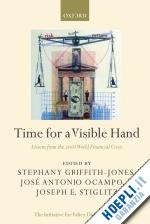Stephany Griffith-Jones is an economist whose areas of expertise include global capital flows to emerging markets and international financial reform. Prior to joining IPD, Professor Griffith-Jones was Professorial Fellow at the Institute of Development Studies at University of Sussex and served as Senior Official at the United Nations Department of Economic and Social Affairs and the Economic Commission of Latin America (ECLAC), and as Head of International Finance at the Commonwealth Secretariat. She has acted as senior consultant to governments in Eastern Europe and Latin America and to many international agencies, including the World Bank and United Nations. She began her career at the Central Bank of Chile. She has published many articles and books including International Finance and Development with Jose Antonio Ocampo and Jan Kregel. She received the Association of Latin American Financial Institutions prize for best essay on Latin America's international finance. José Antonio Ocampo is Professor in the School of International and Public Affairs and Fellow of the Committee on Global Thought at Columbia University. Prioir to this, Professor Ocampo served as the United Nations Under-Secretary-General for Economic and Social Affairs, and head of UN Department of Economic and Social Affairs (DESA), as Executive Secretary of the UN Economic Commission for Latin America and the Caribbean (ECLAC), and has held a number of high-level posts in the Government of Colombia, including Minister of Finance and Public Credit and Director of the National Planning Department. He has also served as Executive Director of FEDESARROLLO, the main think tank on economic issues in Colombia, Director of the Centro de Estudios sobre Desarrollo Economico of Universidad de los Andes, Professor of Economics at Universidad de los Andes, and Professor of Economic History at Universidad Nacional de Colombia. He has also been Visiting Professor at Cambridge, Oxford and Yale Universities. Joseph E. Stiglitz holds joint professorships at Columbia University's Economics Department and its Business School. He is co-chair of IPD's macroeconomics, CML, and Intellectual Property Task Forces. From 1997 to 2000 he was the World Bank's Senior Vice President for Development Economics and Chief Economist. From 1995- 97 he served as Chairman of the U.S. Council of Economic Advisers and as a member of President Clinton's cabinet. From 1993 to 1995 he was a member of the Council of Economic Advisers. He was previously a professor of economics at Stanford, Princeton, Yale, and All Souls College. Dr Stiglitz is a leading scholar of the economics of the public sector and was awarded the Nobel Prize in Economics in 2001 in addition to the American Economic Association's biennial John Bates Clark Award in 1979. His work has been recognized through his election as a fellow to the National Academy of Sciences, the American Academy of Arts and Sciences, the Econometric Society, and the British Academy.











